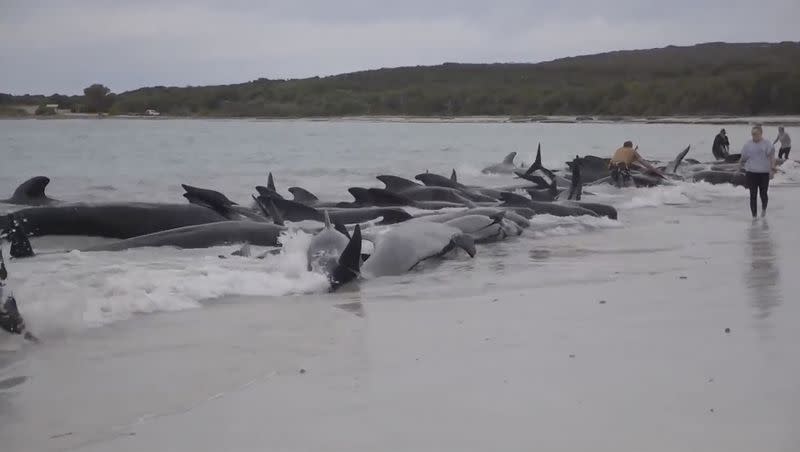Why do whales wash up onshore?

Nearly 100 pilot whales beached off the shores of a remote beach in Western Australia Tuesday. Two days later, all of them had to be euthanized after a nearly-successful rescue attempt, according to CBS News.
“We will never forget this and at least we can say we tried our best!!” Mike Conway, an Australian resident who was involved with the rescue, wrote on Facebook.
In Scotland, a similar stranding happened last week when 54 whales beached themselves on the Isle of Lewis. Most died before they were discovered, and “rescue teams decided to euthanize the surviving animals after determining that the rough waves and shallow beach made it unsafe to refloat them,” The New York Times reported.
The Zoological Society of London’s Cetacean Strandings Investigation Programme in the United Kingdom reported “more than 12,000 stranded cetaceans since 1990,” according to National Geographic.
So why do whales beach themselves?
Sometimes whales beach themselves because of pregnancy, injury, sickness or another weakness.
When the mammal gets weak, it might drift in with the tide or be unaware of how shallow the waters are until it’s too late.
Another reason could be hunting. Dolphins sometimes swim onto the beach to escape an orca chasing it. And orcas will often launch themselves on the shore, but sometimes miscalculate and go too far away from the water, according to National Geographic.
Other times, sonar wreaks havoc on whales’ navigation. It “interferes with whales’ ability to communicate and navigate” and can cause fear and panic, pushing them to shore, National Geographic reported. Sound is more powerful underwater than in the air and it also reverberates for longer, so sonar could potentially drastically injure a whale’s hearing capabilities.
“Stop all of the sonar, stop all of the pre-construction activity offshore right now, until we can determine whether or not that has had any impact or any part of the cause for all these whales washing up,” Cindy Zipf, executive director of Clean Ocean Action, told CBS News, in hopes that scientists can determine why so many strandings are happening at once in the last month.
Pollution and fishing could also be factors in causing the whales to strand themselves. Getting caught in fishing lines is the main cause of death for cetaceans.
Why do mass whale strandings happen?
We don’t have a lot of answers for why mass groups of whales will sometimes strand themselves.
“The cause of a group stranding is often hard to determine because it is difficult to study the behavior of whales pre-stranding,” Scott Baker, marine biologist and professor for the Marine Mammal Institute at Oregon State University, told Live Science.
Some species are more prone to beaching themselves than others. Those species include toothed whales like dolphins, porpoises and other whales with teeth. They tend to be more social and travel in large groups that include “intricate social systems,” meaning that if one member of the group gets stranded, others will try to help, according to Wildlife Florida.
Another cause could come down to the social nature of those groups — a leader mistakenly swims too close to the shore, the group follows and no one realizes until it’s too late.
According to Live Science, the biggest stranding of one whale species was 835 false killer whales near Mar del Plata, Argentina, in 1946.
What should you do if you find a stranded whale
According to Whale and Dolphin Conservation, if you discover a whale or dolphin washed up onshore, you should report it as quickly as possible. Here are the best places to contact experts to help.
U.S. Northeast region: Marine Mammal and Sea Turtle Stranding and Entanglement Hotline, 866-755-6622.
U.S. West coast region: Marine Mammal and Sea Turtle Stranding and Entanglement Hotline, 866-767-6114.
British Columbia, Canada: DFO hotline, 800-465-4336.
Nova Scotia, Canada: Marine Animal Response Society Hotline, 866-567-6277.

